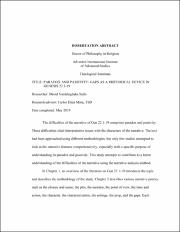Paradox and passivity : gaps as a rhetorical device in Genesis 22:1-19
Abstract
The difficulties of the narrative of Gen 22:1-19 comprises paradox and passivity.
These difficulties elicit interpretative issues with the characters of the narrative. The text
had been approached using different methodologies, but only few studies attempted to
look at the narrative features comprehensively, especially with a specific purpose of
understanding its paradox and passivity. This study attempts to contribute to a better
understanding of the difficulties of the narrative using the narrative analysis method.
In Chapter 1, an overview of the literature on Gen 22:1-19 introduces the topic
and describes the methodology of the study. Chapter 2 describes various narrative poetics
such as the closure and scene, the plot, the narrator, the point of view, the time and
action, the character, the characterization, the settings, the prop, and the gaps. Each
2
narrative poetic description is immediately followed by the application of the poetics in
the narrative of Gen 22:1-19. Chapter 3 presents the understanding of the paradox and the
passivity based on the narrative analysis in Chapter 2. Brief theological insights that
emerge from the study follow. Chapter 4 presents the summary and the conclusions of the
study.
The study concludes that paradox and passivity are an integral part of the
storytelling technique. The paradox of the promise of progeny with the test is part of the
complication of the plot that builds tension in the narrative. After Abraham’s words and
actions in the transforming action of the plot remove the tension, the promise of progeny
is reaffirmed in the final situation of the plot. The paradox of the enigmatic words of
Abraham are subtle revelations of the motive for his obedience. The unprotested
obedience of Abraham is the key to removing the tension of the plot which is inspired by
his belief that God will provide. The silent submission of Isaac is part of the rhetoric
device that demonstrates the main plot of the narrative—Abraham’s obedience to God.
Since Abraham is tasked to remove the tension of the plot, other details that do not
contribute to it are left out of the narrative. Thus, paradox and passivity are parts of the
narrative convention that contribute to the plot of the narrative: Abraham obeys God
because he believes that God will provide, and God did provide.


